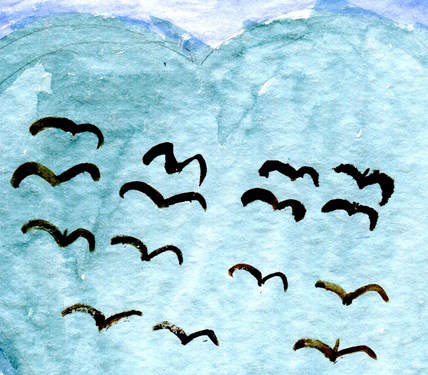Published: 8 February 2018
I hear them in the distant kitchen from my bedroom, my parents, Hadassah and Meier, and their old-world friends, their voices a murmur, their conversation interwoven with an incantation: Orly. Bialystok. Bransk. Grodek.
We lived in a rented single-fronted terrace, 387 Canning Street, North Carlton. My parents paid a fortune in ‘key money’ to the previous renter, to get a foot through the door. That is how it was in the 1950s and 60s, with the rundown worker-cottages of the inner suburbs close to the factory districts in high demand, immigrants pouring in, housing shortages.
I lived in two worlds back then. My parents were busy making a new life in a new world, working in factories and at a stall in the Victoria Market. Out in the streets, we roamed free. Clambered over the cracked tiled roofs. Placed penny-bungers in letter boxes on Guy Fawkes night, lit the wick, and scrammed. Squeezed through the gap in the iron palings that enclosed the Melbourne Cemetery – the dead centre of Melbourne we called it. Played a game we called ‘walking on air’. The aim was to get from one side of the cemetery to the other without touching the ground.
In the house, it was another world. Another way of being. English was my parents’ sixth language. Yiddish was the mother tongue, a language interlaced with that incantation: Orly. Bialystok. Bransk. Grodek. Over there, in the old world, Meier was a Yiddish poet, and Hadassah, a singer of Yiddish song.
In the new world, her voice was confined to the house. She sang as she cleaned and cooked, and sat at the Singer sewing machine doing piecework for the hosiery mills of Brunswick and the garment district of Flinders Lane. She sang in the washhouse, bent over the stone sink, her forehead dripping with sweat. Lullabies and laments, songs of gypsies and miraculous goats, ballads of work and struggle, songs of birch trees and forests of pine in the much-loved ancestral landscape – the east Poland borderlands.
Father would say: “I was born in Russia in 1905, a year of revolution, and by the time I was thirteen I’d lived in three countries and gone nowhere.” It depended on which army marched into town. Now in Australia, ek velt as my parents called it, the ends of the earth – all that remained was that incantation, and a house of absences and ghosts. Black and white photos in albums.
“Mum, who are these people?” I’d ask. “Three of my six sisters, one of my three brothers, uncle Joshua, your grandmother, and your cousins Freda, eight years old, and Chaimke, fourteen.” “Where are they now?” For this there was no answer. Hadassah could not speak of what had befallen them. Just two sisters remained of the entire extended family. On father’s side, it appeared, there was no one alive, bar a brother who had disappeared in Soviet Russia, last heard of in 1930.
Why were my parents alive while so many others vanished? Was it fate? The toss of a coin? Was it that balmy Saturday night in Bialystok in the summer of 1932: Hadassah and Meier strolling on Sienkiewicza Avenue, Kondruchuk the White Russian selling ice cream, the crowds queuing at the Apollo Cinema, the Macedonian Quarters doing a brisk trade in halva and Turkish Delight. And as if from afar, Meier hears Hadassah’s voice: “How would you like to live in Melbourne? My sister Feigl can arrange a permit.” At that moment, Meier was jolted from the crowd and thrust in a new direction. He saw oceans appearing, new worlds on the horizon.
Meier told me the story, and many others, on a bench in Curtain Square, the neighbourhood park in North Carlton. Seated on our favourite place, beneath the Moreton Bay Figs. 1987. I had recently returned from a three-month journey to the borderland towns and villages: Orly. Bialystok. Bransk. Grodek. I had walked the streets, the landscapes of Hadassah’s songs, Meier’s poems, and returned with the maps of their youth and early adulthood.
The maps opened a Pandora’s box of stories, a new conversation. A mention of a specific street would trigger many tales. What struck me about the tales was the apparent workings of chance, the fragility. The role of luck: “I was lucky that I stood under that tree when the bombs fell. My best friend under that tree, he was killed. And I survived.”
I have heard countless variations of this sentiment over the years. From my parents, their old-world friends, and more recently, from refugees and asylum seekers of many lands who have attempted to make it to our shores.
Take Amal Basry, one of over 400 asylum seekers who boarded a vessel on 18 October, 2001 bound for their dream destination, Australia. The boat sank the following day en route to Christmas Island. 353 men, women and children drowned.
45 survived. Amal Basry was one of seven who was finally allowed to settle in Australia. She survived the sinking by clinging to a corpse for over 20 hours.
Did she truly survive? There were times when Amal saw herself as cursed, and duty-bound to tell the story. She recounted it many times – at public gatherings, to an audience of more than 2,000 at the Melbourne Town Hall, to anyone willing to listen. She would leave her sick bed after bouts of chemotherapy to tell the story. She was haunted by what had befallen her. “The children,” she told me, “They looked like birds. They looked like they are going to fly in the water.” In a cruel irony, she died of cancer a year after finally receiving her permanent visa.
Take former Hazara refugee, Arif Fayazi. I first met him in December 2000, recently released from Woomera Detention Centre, where he was called by the number CAI-20. Arif fled Afghanistan in fear of his life, leaving behind a wife and three young children. He would walk the streets at night, unable to sleep, agonised by the separation. In 2002, he received the news that two of his children had died of illness. “I was born with teeth,” he would tell me. “In my culture this means I am destined to be unlucky.”
Take the men marooned on Manus Island, four years and still counting. I ask Behrouz Boochani, Kurdish-Iranian writer, detained on the island since August 2013: What do the men think about their predicament? “It is a very hard question,” he replies. “Many of the refugees think they are very unlucky people to end up on this remote island. The question tortures them.”
Behrouz too has agonised over it. “I started my journey from Indonesia on 16 July, 2013. I always think about it, and ask myself: What if the boat did not get lost and I arrived before 19 July? But we arrived 23 July, four days after the new law was passed. We were the unlucky ones, caught by this sudden change in policy.”
The children…they looked like birds. They looked like they are going to fly in the water
The shadow of loss reaches out to succeeding generations. “Fate is so fragile, a mere straw on the breeze.” I have written these words before. I carry this sense of things within me. Perhaps it is a form of possession. In Jewish mythology, a dybbuk is the dislocated soul of a dead person seeking a living being to inhabit. It derives from a Hebrew word, meaning to adhere, or to cling. This sense of fragility, and the fickle ways of chance is, perhaps, my personal dybbuk. Maybe a trace of the survivor’s guilt that plagued Hadassah to the point of madness, also adheres to me.
Hadassah did not deserve her agony. She did everything she could to obtain a way out, a visa for members of her family. She knocked on doors, pleaded with immigration officials. But it was too late. The doors of the new world were sealed. Amal too was afflicted by this sense of unease at her good fortune. Possessed. Condemned over and again to relive the tragedy.
Perhaps we all need to be possessed of this understanding. Hence more alert to the plight of others still caught in limbo, mid-journey. Sailors and nomadic peoples know it well, that with just one shift in the wind, you and I can be the stranger, in desperate need of shelter. Sanctuary.
This is the reason island and desert peoples often possess cultures of receiving the stranger. First the stranger is greeted and fed, and given a roof over their head. Only then are they asked to tell their story. This process is built into the structure of the Odyssey. Odysseus is washed up naked, on Scheria, the island of the Phaeacians. He is discovered by princess Nausicaä, and her handmaidens. She directs Odysseus to the royal capital. At play is an ancient conflict, between hospitality and hostility – between xenophobia, literally ‘fear of the stranger’, and philoxenia, ‘friend of the stranger’.
In the real-life journeys of contemporary asylum seekers, there are no guarantees of a happy ending
On Scheria, philoxenia finally prevails. Only after Odysseus’ basic needs have been taken care of does King Alcinous rise at the welcoming banquet, and ask:
And now, speak and tell us truly, where have you been in your wanderings? Which parts of the inhabited world have you visited? What lovely cities did you see, what people in them? Did you meet hostile tribes with no sense of right or wrong, or did you fall in with hospitable and god fearing people?
The Odyssey is one of the great ancient framing stories, a prototype of the hero’s quest, driven by a longing to return to the homeland. Blind Homer, the storyteller is in control. He sings the tale night after night. The hero is delayed and distracted. He encounters monsters, sirens, is caught on raging seas. His boats are tantalisingly within reach of Ithaca when, due to the greed of his men, they are blown back by malevolent winds. Homer also defers to the gods. Odysseus’ fate is in their hands, and in turn, in the hands of the storyteller.
The Odyssey echoes other ancient framing stories such as the Arabian Nights. Scheherazade tells stories for 1001 nights to save her life. She must keep the king enthralled by yet another story, another twist in the plot, another delay. Only when her storytelling is done, is the threat of imminent death removed. Similarly, after a 20 year absence from Ithaca, Odysseus finally makes it ashore on the beloved island.
But in the real-life journeys of contemporary asylum seekers, there are no guarantees of a happy ending. The shifts in the plot are not decided by Aladdin’s magic lantern, a genie, or by the Gods debating Odysseus’ fate on Mount Olympus. Nor is it, as in fairy tales, a matter of serendipity – the fact of finding, or stumbling upon good fortune by chance. In real-life the outcome can be unfair, unjust and brutal.
Six men have already died on Manus Island from murder, suicide, medical neglect and accident. They will never see the promised shore. After four and a half years of incarceration, for most detainees there is still no end in sight. Their statelessness has become chronic.
The men’s fate is beyond the storyteller’s control. It is a matter of daring to embark on the journey, as my mother did as the storm clouds of war were gathering.
It may be a visceral and immediate response to a knock on the door in the dead of night, and a warning, the enemy is here and they are looking for you. This is how it was for Arif Fayazi. Or it may be the slow-burn of years of oppression as it was for Amal Basry and her family. Life is full of these kinds of fates. I think it is best to accept and understand that anything can happen.
It is often a political affair. The plot can sometimes be shifted by activism and resistance. Indeed, as of writing, about 600 men on Manus Island, have barricaded themselves in the former detention centre in a desperate bid to secure their safety and freedom.
But while the storyteller cannot control the real-life story, she can certainly tell it. The story, and its dissemination, remains critical. Story is a powerful tool of the advocate. Story humanises. It is an intimate art form. It seeks to counter indifference, and policies designed to keep the oppressed out of sight, and hence out of mind. Story can highlight the fact that there, for the luck of the draw, go I. Story can reveal the nightmare and the ongoing drama of statelessness.
The most powerful storytellers are the refugees themselves. They are the authorities of their own quest and story. They are living it. Behrouz Boochani, among others, continues to bear witness from the inside: in film, social media posts, feature articles, and countless stories.
Yet despite the nightmare, Behrouz resists reducing life to a play of chance. “I do not think it’s fate or luck," he says. "It is a part of life, and life is full of these kinds of fates. I think it is best to accept and understand that anything can happen in life.”
Behrouz has earnt the right to say it. He knows at the core of his being, the deeper truth: refugees and asylum seekers will always keep coming. He knows that they are us, and we are them.
The dream of a better life is as old as humanity, and history is an endless tale of quests and movement. Ours is a country that has faced wave upon wave of newcomers. Wave is an apt word, with its resonance of ceaseless rhythms, ever-recurring cycles of retreats and advances. Incantations: Orly. Bialystok. Bransk. Grodek.
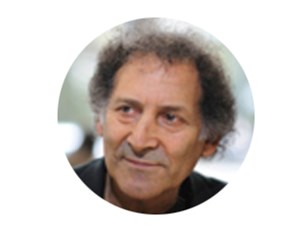
Arnold Zable
Arnold Zable is an Australian writer, novelist, storyteller and human rights advocate. His books include Jewels and Ashes, Cafe Scheherazade, The Fig Tree, Scraps of Heaven, Sea of Many Returns, Violin Lessons, and most recently, The Fighter. He has published numerous features, essays, and stories in a range of journals and anthologies, and writes a column in The Age titled, ‘Philoxenia’ Friend of the Stranger. He received the 2013 Voltaire Prize for human rights advocacy and was awarded the 2017 Australia Council Fellowship for Literature.
You May Also Like
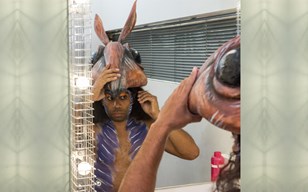
Behind the Scenes
Our Behind the Scenes series takes you on an exclusive journey into the heart of QPAC, where the magic of the stage comes to life.
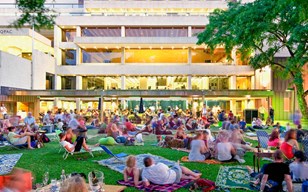
Projects and Events
QPAC is more than a venue; it's a creative hub where communities come together to celebrate, learn, and grow through the transformative power of the arts.

Digital Stage
Digital Stage provides a platform for a diverse range of performances, bringing the arts beyond the theatre walls.
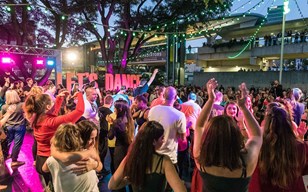
Support
Support QPAC to help nurture and celebrate Queensland's rich artistic heritage while fostering innovation and creativity for the future.

